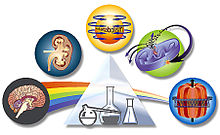Structural Biochemistry/Pharmacology
Definition
[edit | edit source]
Pharmacology is an area of science which relates to the discovery, chemistry, composition, identification, biological and physical effects, uses and manufate of drugs. [1] Pharmacology is commonly mistaken for pharmacy, which is a profession involving the preparation, and dispensing of drugs. It can be mainly split into the subdivisions of pharmacodynamics , which deals with the physiological effects of drugs on biological systems, and pharmacokinetics , which deals with how biological systems affect the drugs. ADME is an acronym used in pharmacology to describe the four main stages through which drugs pass through the body. The stages are absorption, distribution, metabolism, and excretion.
Different Pathways to Drug Discovery
[edit | edit source]Compound > Physiological effect > molecular target
In the first approach, a substance is identified which has a desirable physiological consequence when tested. Biological effect is known before molecular target is identified.
Molecular target > compound > physiological effect
In the second approach, a substance is a known molecular target. Compounds are sought by experimenting with desired properties which bind to target molecule and change its properties. From there, scientists can explore their effects on appreciate cells / organisms.
Further Subdivision
[edit | edit source]Modern pharmacology today can be further split into many categories of specific research[2]
For example:
- Behavioral pharmacology - study of how drugs or medications affect behavior
- Biochemical pharmacology - Use of biochemistry to study how drugs affect the body's chemical pathways
- Cardiovascular pharmacology - study how drugs affect the heart and vascular system
- Chemotherapy - division of pharmacology that deals with treatment of microbial infections and cancer
- Clinical pharmacology - study of pharmacokinetics and pharmacodynamics within the human body
- Molecular pharmacology - study of how drugs or medications interact with the cell
- Neuropharmacology - study of how drugs or medications affect the nervous system
- Toxicology - study of the toxic effects that drugs may have
Development of Drugs and Challenges it entails
[edit | edit source]Compounds have significant effects when taken into the body but only small fractions have potential to be useful.
Factors in determining drug effectiveness:
- Strength of interactions between the drug and its target
- Must be easily administered and must react target at sufficient concentration
ADME Properties
[edit | edit source]- Absorption : process in which substance enters bloodstream, preferably via small pills to be able to survive the acidity of gut and absorbed through intestinal epithelium.
- Distribution : process in which substance is dispersed throughout the body
- Metabolism : transformation of medicine from parent compound to daughter compound
- Excretion: removal of substance from the body
References
[edit | edit source]- ↑ Biochemistry Berg 7th Edition
- ↑ http://www.aspet.org/about_pharmacology/